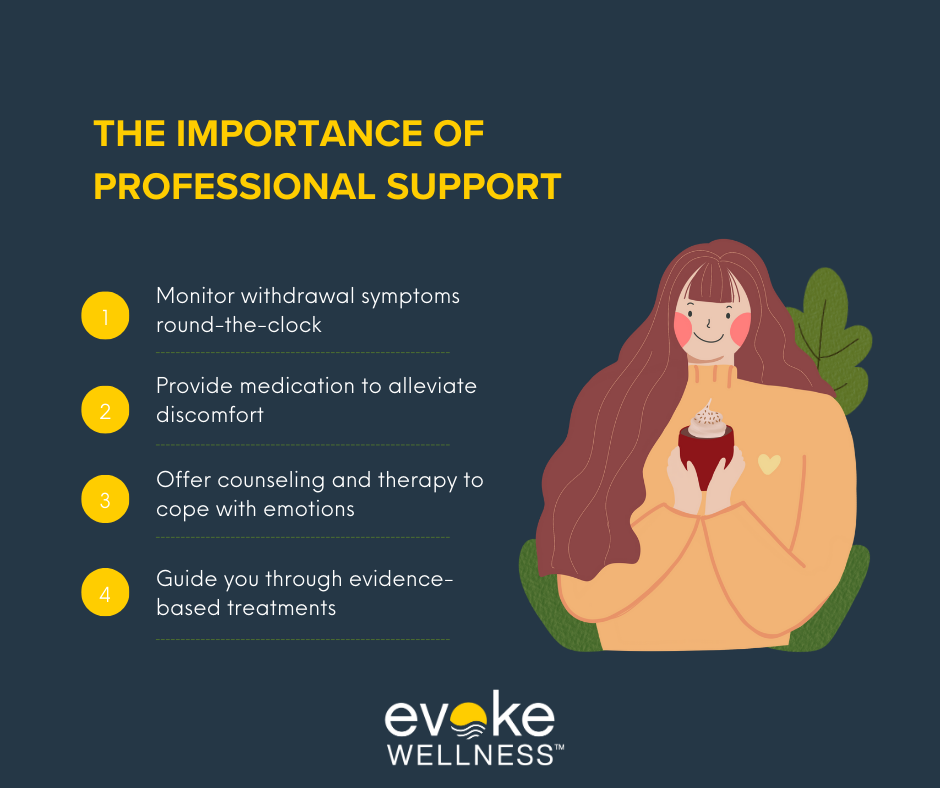Embarking on the journey of detoxification can be a transformative experience, but it often comes with unexpected emotional challenges. As you take steps towards recovery, you may find yourself grappling with intense feelings of anxiety, depression, and persistent cravings. Recent studies show that up to 80% of individuals undergoing detox experience significant mood disturbances. Understanding and preparing for these emotional side effects is crucial for your success. This article will explore the psychological aspects of detox, providing you with evidence-based strategies to navigate the turbulent waters of early recovery. By equipping yourself with knowledge and coping mechanisms, you’ll be better prepared to face the emotional hurdles that lie ahead on your path to wellness.
Together, let’s embrace the journey to recovery and the promise of a new beginning. Call us at (833) 819-6066 today or reach out online.
Understanding the Emotional Impact of Detoxification
The detoxification process is an essential first step towards overcoming addiction, but it can also be an emotionally challenging journey. As your body rids itself of toxic substances, you may experience a range of intense emotional responses.
Withdrawal and Emotional Turmoil
Withdrawal symptoms can manifest not only physically but also psychologically. Common emotional experiences during detox include anxiety, depression, irritability, and mood swings. This emotional turmoil can be overwhelming, making it crucial to have professional support and guidance.
- Anxiety and panic attacks may arise as your body adjusts to sobriety.
- Depressive episodes can occur, leading to feelings of hopelessness or despair.
- Mood swings and emotional outbursts are common as your brain chemistry rebalances.
Cravings and Relapse Risks
One of the most significant emotional challenges during detox is coping with intense cravings for the substance you’re withdrawing from. These cravings can be both physical and psychological, making the risk of relapse a constant concern. Emotional support and coping strategies are essential to navigate this phase successfully.
Professional Support and Therapy
Seeking professional help in a medically supervised detox program can provide the emotional support and therapeutic interventions necessary to manage these emotional challenges. Trained staff can administer medications to ease withdrawal symptoms, while counseling and therapy sessions can help you develop healthy coping mechanisms and address underlying psychological factors contributing to addiction.
By understanding the emotional impact of detoxification, you can better prepare for this transformative journey and embrace the support available at comprehensive addiction treatment programs like Evoke Wellness Miramar. With the right guidance and commitment, you can overcome the emotional hurdles and take the first steps toward lasting recovery.
How Anxiety and Depression Can Arise During Detoxification
During the detoxification process, individuals may experience a range of unpleasant physical and psychological symptoms as their bodies work to regain balance without the presence of the substance they were dependent on. This disruption in brain chemistry can contribute to the development or exacerbation of anxiety and depression.
Withdrawal’s Mental Impact
As explained on the Evoke Wellness blog, post-acute withdrawal syndrome (PAWS) can cause crippling anxiety, depression, insomnia, and cognitive impairment for months after quitting substances like opioids, benzodiazepines, or alcohol. The severity depends on factors like the substance abused, length of addiction, genetics, and life stressors.
The intense cravings, mood swings, and psychological distress during this stage can make the recovery process extremely challenging without proper support and treatment.
Addressing Co-Occurring Disorders
For individuals with pre-existing mental health conditions or dual diagnoses, detoxification can be an especially high-risk time. As noted, withdrawal symptoms can trigger or worsen anxiety, depression, and other psychological issues, increasing the risk of relapse if not properly managed.
Comprehensive addiction treatment programs incorporate therapies like cognitive-behavioral therapy (CBT), dialectical behavior therapy (DBT), medication management, and counseling to stabilize mental health during this crucial phase.
Techniques to Help Mitigate Anxiety and Depression During Detox
During the detox process, individuals often experience heightened anxiety, mood swings, and depressive episodes due to the physical and psychological effects of withdrawal. Implementing effective techniques to manage these emotional challenges can greatly improve one’s chances of successful recovery.
Cognitive-Behavioral Therapy (CBT)
CBT is an evidence-based therapy that helps individuals identify and modify negative thought patterns and behaviors. By challenging distorted beliefs and developing healthier coping mechanisms, CBT can alleviate anxiety and depression during detox.
Dialectical Behavior Therapy (DBT)
DBT is particularly beneficial for individuals with co-occurring mental health disorders. It teaches mindfulness, emotional regulation, and interpersonal effectiveness skills, equipping individuals with the tools to manage intense emotions and distress during the detox process.
Medication-Assisted Treatment (MAT)
MAT involves the use of FDA-approved medications, such as Suboxone or Vivitrol, to alleviate withdrawal symptoms and cravings. By reducing physical discomfort and psychological cravings, MAT can significantly improve treatment outcomes and mitigate anxiety and depression during detox.
Holistic Therapies
Incorporating holistic therapies like yoga, meditation, and acupuncture can promote relaxation, improve sleep, and enhance overall well-being. These practices can help individuals cope with the emotional upheaval of detox and contribute to a more balanced state of mind.
By integrating these evidence-based techniques into a comprehensive detox program, individuals can effectively manage the emotional side effects of withdrawal, laying a solid foundation for long-term recovery.
Creating a Supportive Environment for Emotional Wellbeing During Detox
Foster a Compassionate Community
During detox, you may experience intense emotions like anxiety, depression, or cravings. Surrounding yourself with a supportive, non-judgmental community can provide immense comfort. Support groups, facilitated by addiction professionals, create a safe space to share your struggles without stigma. Peer support promotes personal growth, healing, and a sense of belonging, reducing feelings of isolation.
Embrace Holistic Therapies
Incorporating holistic practices like mindfulness, yoga, and meditation can help you navigate the emotional turbulence of detox. These therapies promote overall wellness, allowing you to stay grounded and focused on your recovery journey. Evoke Wellness in Miramar, Florida, offers an Intensive Inpatient Program that integrates evidence-based therapies like Cognitive Behavioral Therapy (CBT) and Dialectical Behavioral Therapy (DBT) with holistic approaches to address the physical, emotional, and psychological aspects of addiction and mental health.
Foster Family Support
Involving loved ones in your recovery process can provide invaluable emotional support during detox. Family involvement helps strengthen communication and support systems, which are crucial for navigating the challenges of detox. Evoke Wellness encourages family participation, recognizing the transformative power of a strong support network.
By fostering a compassionate community, embracing holistic therapies, and involving loved ones, you can create a nurturing environment that promotes emotional wellbeing during the detox process. Remember, you are not alone on this journey, and with the right support, you can emerge stronger and more resilient.
Managing Cravings and Detoxifying from Addiction
Understanding Cravings
Cravings are intense urges to use substances. They can be triggered by environmental cues, stress, or even positive emotions. According to a study by the National Institute on Drug Abuse, cravings involve the brain’s reward and motivation circuits, making them difficult to resist.
Coping Strategies
- Practice mindfulness and relaxation techniques like deep breathing or meditation to manage stress and cravings.
- Distract yourself with healthy activities like exercise, hobbies, or social support when cravings strike.
- Identify and avoid triggers that may increase cravings, such as certain people, places, or situations associated with substance use.
Detoxification Process
Detoxification is the first step in addiction treatment, allowing the body to eliminate substances and manage withdrawal symptoms. A report by the Substance Abuse and Mental Health Services Administration highlights the importance of medically-supervised detox for alcohol and certain drugs to ensure safety and comfort.
Comprehensive Treatment
While detox addresses physical dependence, comprehensive addiction treatment is crucial for long-term recovery. This may include behavioral therapies, medications, support groups, and addressing underlying mental health issues through counseling and dual diagnosis treatment.
By implementing effective coping strategies and committing to a comprehensive treatment plan, individuals can manage cravings and successfully navigate the detoxification process, paving the way for sustained recovery from addiction.
Seeking Professional Help for Emotional Support During Detox
Detoxification from drugs or alcohol can be an emotionally turbulent experience. As your body rids itself of substances, you may grapple with intense cravings, anxiety, depression, irritability, and mood swings. This emotional rollercoaster can make the detox process challenging and increase relapse risks.
The Importance of Professional Support
Attempting to detox alone can be risky and overwhelming. Professional support from an accredited addiction treatment facility is vital for a safe, medically-supervised detox process. Trained clinicians can:

Comprehensive Emotional Care
A holistic approach combines medical detox with mental health support. Reputable rehabs like Evoke Wellness offer:
- Individual and group therapy sessions
- Medication-assisted treatment for dual diagnosis
- Coping strategies for anxiety and depression
- Relapse prevention planning for long-term recovery
Seeking professional help ensures you receive the emotional support needed during this vulnerable time. With 24/7 monitoring and integrated care, you can focus on healing – body and mind.
FAQ: How Do I Emotionally Detox and Cope with Anxiety and Depression?
Recognize the Challenges
- Detoxing from substances can be an emotionally turbulent process, often accompanied by anxiety, depression, mood swings, and intense cravings.
- These symptoms arise as the brain and body readjust to functioning without the presence of addictive substances, according to Evoke Wellness at Miramar.
Utilize Comprehensive Support
- A reputable detox program offers comprehensive support to help individuals cope with the emotional side effects of withdrawal.
- Evoke Wellness provides medical detoxification with 24/7 supervision, therapy, dual diagnosis treatment, and holistic therapies to address underlying mental health concerns.
- This multifaceted approach equips individuals with healthy coping mechanisms and prepares them for a successful transition into long-term recovery.
Embrace Healthy Habits
- Incorporating healthy habits during detox can significantly improve emotional well-being and resilience.
- Exercise stimulates neurotransmitters like endorphins, serotonin, and dopamine, which can alleviate symptoms of anxiety and depression.
- Engaging in physical activity, practicing mindfulness techniques, and maintaining a balanced diet can help regulate emotions and provide a sense of structure during this challenging phase.
Seek Professional Guidance
- It’s crucial to seek professional guidance and support throughout the detox process to effectively manage emotional challenges.
- Licensed therapists, counselors, and mental health professionals can provide personalized strategies, counseling, and medication management if needed.
- Participating in individual and group therapy sessions can foster a supportive community and equip individuals with valuable coping skills.
By recognizing the emotional challenges of detox, utilizing comprehensive support services, embracing healthy habits, and seeking professional guidance, individuals can navigate the emotional side effects of detoxification with greater resilience and preparedness for long-term recovery.
Conclusion
As you navigate the emotional challenges of detoxification, remember that these feelings are temporary and part of the healing process. By implementing the coping strategies discussed, you can effectively manage anxiety, depression, and cravings. Recent studies show that up to 75% of individuals experience emotional side effects during detox, but with proper support, 90% successfully complete the process. Your journey to recovery is unique, and it’s crucial to lean on professional guidance and your support network. With perseverance and the right tools, you can overcome the emotional hurdles of detox and pave the way for lasting sobriety. Remember, each step forward is a victory, no matter how small it may seem.
Begin Your Journey with Evoke Wellness at Miramar
If you or a loved one is considering treatment, Evoke Wellness at Miramar invites you to contact us. Our compassionate team is ready to answer your questions, discuss your needs, and help you take the first steps toward recovery. In Miramar, you’ll find more than just a treatment program – you’ll discover a community dedicated to your wellness and success. Together, let’s embrace the journey to recovery and the promise of a new beginning. Call us at (833) 819-6066 today or reach out online.


